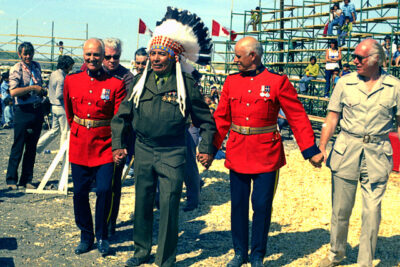Indigenous warrior felt duty to fight for freedom
By Alexandra Noad - Lethbridge Herald Local Journalism Initiative Reporter on June 7, 2024.
 Veteran Patrick Eagle Child, wearing a headdress and military uniform, "captures" four participants - two RCMP officers and the late writer and broadcaster Pierre Berton, as part of a Kainai Chietainship ceremony in Standoff in 1973. Photo courtesy of the Galt Museum & Archives P19931064422
Veteran Patrick Eagle Child, wearing a headdress and military uniform, "captures" four participants - two RCMP officers and the late writer and broadcaster Pierre Berton, as part of a Kainai Chietainship ceremony in Standoff in 1973. Photo courtesy of the Galt Museum & Archives P19931064422In a time when Indigenous people were seen as less than human and their culture assimilated, many still volunteered to fight for freedom in the Second World War. Due to the Indian Act, these soldiers were denied Canadian citizenship, yet they still served their country with honour.
According to the Veteran Affairs Canada website, more than 3,000 Indigenous people volunteered in the war.
Winslow Eagle Child’s father, Private Patrick Eagle Child, was one of these veterans. He says that although his family celebrated Remembrance Day, his father didn’t talk about it until he was older.
“I could remember a lot of these veterans, they never shared their war stories. I guess it was quite overwhelming, you know,” said Eagle Child.
Eagle Child’s father enlisted in the war on February 28, 1945 and started training in Calgary. He then travelled to Halifax and then shipped off the England and northern Africa for more training.
Eagle Child’s father and uncle participated in Allied landings on June 6, 1944, a day that is now known as D-Day.
Eagle Child said his father had several close calls, such as a near miss from a German sniper.
“My father was in a foxhole and he couldn’t find his lighter. He told his buddy and he said ‘just jump in my foxhole’ and when he jumped in this buddy’s foxhole, his unit was shell bombed,” said Eagle Child.
Eagle Child says that his father served even after surviving a residential school, because he was a natural leader and it was his duty as a warrior to fight for freedom. He looks up to his father for what he did for his country.
“For me personally, I feel, of course, a lot of pride and all, but it was very risky,” said Eagle Child.
Eagle Child said his father had a dream while at war that he was polishing medals on a train and he stopped at a yellow house where he heard children laughing and playing saying “tell us about the war.” When his father came home and was able to reflect he realized the dream symbolized him returning home.
“They were warriors then and my dad would say the dreams that they’re that’s part of our ancestors. We had dreams, visions, what’s going to happen in the future,” said Eagle Child.
Private Eagle Child was honourably discharged on March 12, 1946.
Eagle Child says the best way to honour those who sacrificed their lives is to educate ourselves and our children about what happened.
“Be informed. They fought and put their lives on the line, you know, for our for the freedom. Not only November the 11th, it’s every day.”
16-15


